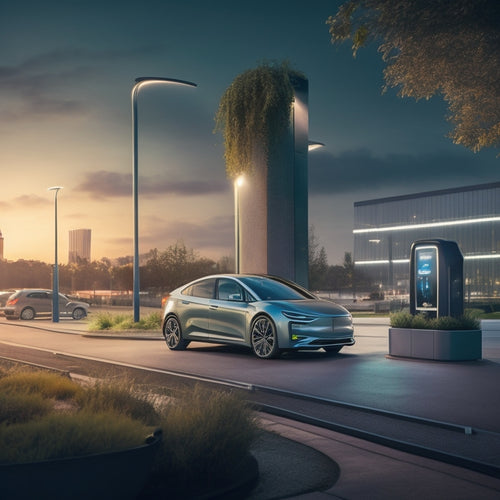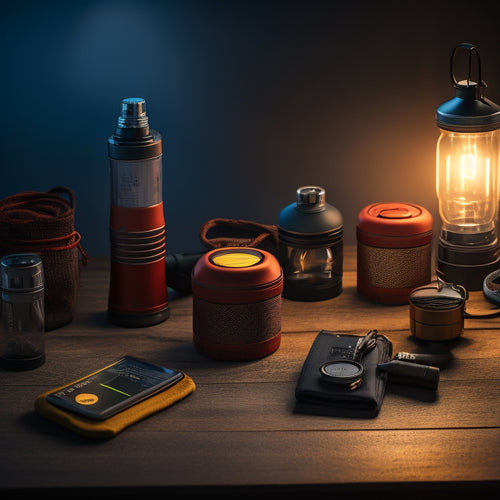
What's the Best Backup for Your Home?
Share
You need a reliable home backup system that can automatically detect power outages and seamlessly shift between grid and backup power, providing you with peace of mind and energy independence. A solar panel battery system is a great option, as it enhances renewable security and reduces your carbon footprint. Key components include a solar panel array, charge controller, inverter, and monitoring system. Choosing the right battery is essential, considering factors like energy storage needs, depth of discharge, and power output. By selecting the best backup for your home, you'll not only guarantee continuous power but also reduce energy consumption and lower your energy bills, and there's more to investigate on this topic.
Key Takeaways
- A reliable solar power backup system ensures seamless transition between grid and backup power during outages, providing peace of mind for homeowners.
- Assessing energy storage needs and selecting the right battery type, capacity, and features is crucial for a suitable backup solution.
- A well-designed system with automatic detection of power outages and efficient energy storage reduces energy consumption and lowers energy bills.
- Professional installation and regular maintenance, including quarterly system testing and annual professional checks, ensure optimal system performance and longevity.
- Tracking efficiency metrics and comparing costs helps homeowners make informed decisions on the best backup solution for their specific needs and budget.
Understanding Solar Power Backup
With the increasing adoption of solar power systems, having a reliable backup solution has become vital for homeowners. You need to guarantee that your home remains powered during grid outages or when your solar panel types aren't generating enough energy.
This is where energy storage comes in - an important component of a solar power backup system. By storing excess energy generated during the day, you can use it to power your home when needed.
Solar panel battery backup systems provide a reliable power source during outages, enhancing renewable security and decreasing the carbon footprint by reducing dependence on fossil fuels.
A good backup system should provide a seamless shift between grid power and backup power, minimizing disruptions to your daily life. You'll want a system that can automatically detect power outages and switch to backup mode, providing you with peace of mind.
Key Components of a System
As you investigate the world of solar power backup systems, understanding the key components that make up a reliable system is vital. A reliable system consists of a solar panel array, a charge controller, an inverter, and a monitoring system.
The solar panel array generates electricity from sunlight, which is then regulated by the charge controller to guarantee safe and efficient charging, taking into consideration factors such as grid connection to prevent overcharging and undercharging.
In addition, careful selection of solar panels is significant for off-grid systems, considering energy usage, battery capacity, and local climate conditions. The inverter converts DC power from the solar panels to AC power for your home.
A monitoring system tracks the system's performance, providing real-time data on energy production and consumption. These components work together to provide system reliability and energy independence, assuring you have power when you need it most.
Choosing the Right Battery
Beyond the solar panel array, a reliable backup system hinges on selecting the right battery.
You'll need to take into account the type of battery that suits your needs. There are three main battery types: lead-acid, lithium-ion, and nickel-cadmium. Each has its pros and cons, so it's important to research and choose wisely.
When choosing a deep cycle battery, it's vital to assess energy storage needs and take into account factors such as voltage, capacity, and cycle life.
When it comes to capacity considerations, you'll want to reflect on:
- Depth of discharge: How much of the battery's capacity will you use before recharging?
- Cycle life: How many charge and discharge cycles can the battery handle?
- Power output: Can the battery provide the necessary power to support your home's energy needs?
Installation and Maintenance Tips
You'll need to guarantee a smooth installation and regular maintenance to get the most out of your backup system. Proper installation techniques can prevent potential issues down the line, so it's crucial to follow the manufacturer's instructions and consider hiring a professional if you're not comfortable with the process.
To make sure your system runs efficiently, create a maintenance schedule that includes:
| Task | Frequency | Description |
|---|---|---|
| Battery inspection | Monthly | Check for signs of wear or damage |
| System testing | Quarterly | Verify the system is functioning correctly |
| Software updates | Semiannually | Install latest software updates |
| Professional maintenance | Annually | Hire a professional to inspect and maintain the system |
Cost and Efficiency Benefits
With a reliable backup system in place, homeowners can reap significant cost and efficiency benefits.
By automating backup processes, you'll reduce the time and effort spent on manual backups, freeing up resources for more important tasks.
Here are three key benefits to evaluate:
-
Reduced energy consumption: Automated backups minimize power usage, leading to lower energy bills and a smaller carbon footprint.
-
Improved data retrieval: With a reliable backup system, you can quickly restore lost data, reducing downtime and associated productivity losses.
-
Accurate cost comparisons: By tracking efficiency metrics, you can make informed decisions about future backup solutions, ensuring the best value for your investment.
Frequently Asked Questions
Can I Use My Backup Power System for RV or Marine Applications?
You can adapt your backup power system for RV or marine applications, but consider the unique energy efficiency and power capacity requirements of these uses, ensuring your system can handle the added load and specific RV or marine power demands.
How Long Does It Take to Recharge a Depleted Battery?
Recharging a depleted battery is like refueling a car - it depends on the pump's speed and tank size. You'll wait longer for a larger battery to recharge, as capacity factors in; expect 2-5 hours for a 1-2 kWh battery, but up to 10 hours for 5 kWh.
Do Backup Power Systems Work With Generators or Wind Turbines?
You'll find that many backup power systems seamlessly integrate with generators, leveraging their output for efficient power supply. Furthermore, some systems are designed to optimize wind turbine efficiency, ensuring you get the most out of your renewable energy source.
Can I Add More Batteries to My Existing System Later?
Will you ever need more power? Probably! Fortunately, you can future-proof your setup by choosing a system that allows battery expansion, making it easy to add more energy storage capacity as your needs grow.
Are Backup Power Systems Compatible With All Electrical Panels?
You'll need to guarantee system compatibility by checking your electrical panel's specifications before installation, as backup power systems have varying installation requirements, and not all systems are compatible with every panel type or configuration.
Related Posts
-

Solid State Batteries in Electric Vehicles
Solid-state batteries revolutionize electric vehicles by offering a longer lifespan and higher energy density than tr...
-

Best Solar Powered Flashlights for Emergency Situations
When you're choosing the best solar-powered flashlights for emergency situations, focus on their brightness, battery ...
-

Diy Off Grid Solar
By embracing DIY off-grid solar, you can break free from grid dependence, slashing your energy bills by up to 90% and...


